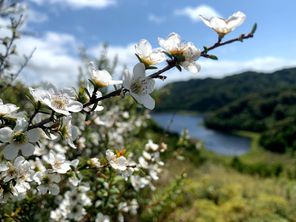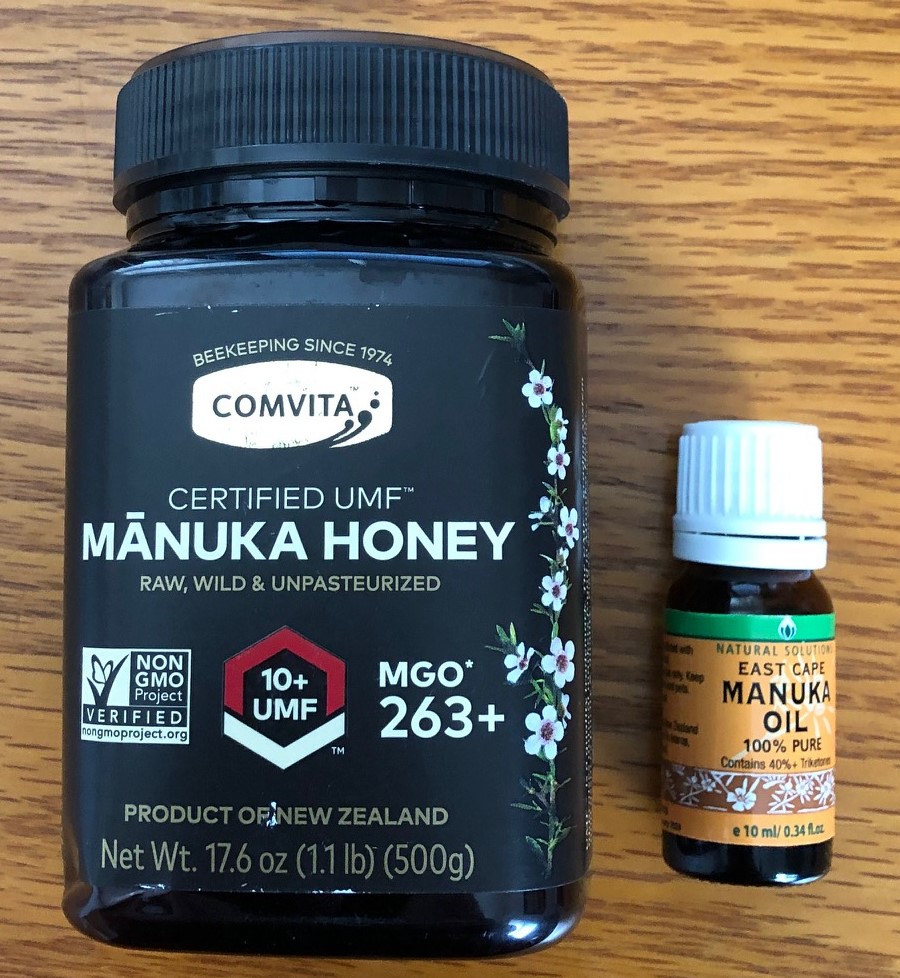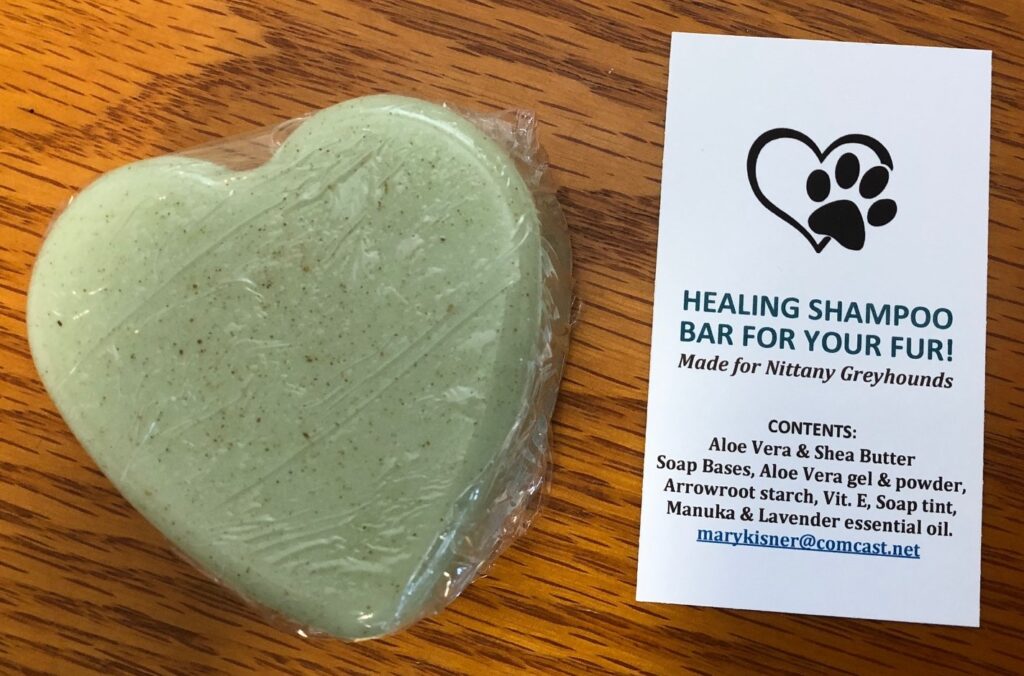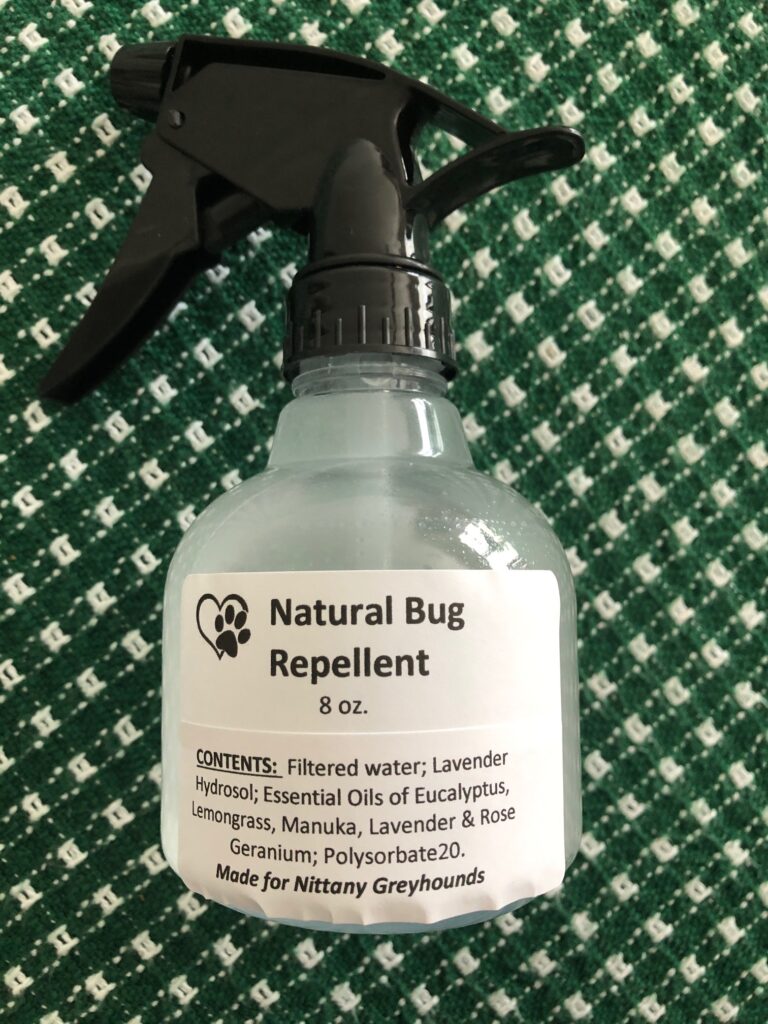I’d like to share what I’ve learned about Manuka Essential Oil. This article is a summary of several research papers about Manuka essential oil. (See additional resources listed at the end of this article). I use Manuka essential oil in almost every soap and body product I make to enhance the product’s healing properties. I thought you might like to know more about it.
What is Manuka?
Manuka is a fast-growing evergreen shrub that is quite hardy and can grow up to 12 in height. Its deep green leaves are set off by small flowers that blossom either white or pink from September through February.

Manuka (Leptospermum scoparium) is native to New Zealand. It is a member of the Myrtaceae family of plants, which includes tea tree (Maleleuca alternifolia). In fact, manuka is considered to be the original tea tree, as the Maori people have long used it medicinally. Manuka essential oil smells like earthy camphor while being slightly sweet balsamic. You may notice it being herbaceous and the sweetness almost honey-like.

What is the difference between Manuka Essential Oil and Manuka Honey?
Both products are made in New Zealand. Manuka honey comes from bees pollinating the native Leptospermum tree. Manuka essential oil, on the other hand, comes from sustainable harvesting the leaves of the Manuka trees/flowers and extracting the oil through steam distillation. Manuka essential oil has antibacterial benefits that are about 100 times stronger than Manuka honey when compared gram for gram! Manuka essential oil is 100% vegan, while Manuka honey is an animal byproduct.

How does Manuka Essential Oil compare to Tea Tree Oil?
Manuka essential oil has tons of phytonutrients that make it one of the most potent essential oils available on the market today. According to one study, Manuka oil has stronger antioxidant activity than tea tree oil, giving it more fighting power against free radicals. It is also less irritating than tea tree oil when applied in small amounts to the skin.
Benefits of Manuka Essential Oil
In lab research out of a university in Italy, several essential oils were tested against 14 different strains of Staphylococcus aureus bacteria (including Methicillin-Resistant…or MRSA), which causes staph infections. After oregano oil, the one that exhibited the highest antibacterial activity was Manuka Essential Oil.
Uses of Manuka Essential Oil for Humans
With all the encouraging research on the effectiveness of using Manuka essential oil topically, many companies are working on formulas to incorporate this oil into skin care products. Athlete’s Foot, dandruff, eczema and acne are all conditions that may be helped with this oil. Internal use of essential oils is still being studied. These oils are also being considered as components in outdoor products to prevent mold and mildew and aphid infestations.
Uses of Manuka Essential Oil in Canine Care
Fleas and ticks are a huge problem for our canine friends. One solution is to give your dog a pill that works systemically…the flea bites the dog and then dies, often leaving an irritating bite or wound on the dog’s skin. To avoid having to give your dog a medication, it would be nice to keep the fleas and ticks away from the dog in the first place.

A few drops of Manuka essential oil can be incorporated into three ounces of chemical-free shampoo to remove fleas and ticks before they bite. To soothe irritating sores from bites, a drop of Manuka essential oil (diluted with a teaspoon of a carrier oil like grapeseed oil or sweet almond oil) may be applied directly to their skin. To help deter the fleas and ticks from even landing on their fur, a natural bug repellent spray made with various essential oils, including Manuka, may help between shampooing. I have added Manuka essential oil to my aloe vera soap/dog shampoo to strengthen its healing properties. Manuka essential oil is also a major component to my natural bug spray. (see https://marykisner.com/greyhounds-still-in-my-heart/)


I’m sure you’ll be hearing more about the healing properties of Manuka honey and Manuka essential oil in the next few years! Enjoy!
GENERAL SAFETY INFORMATION
When used according to instructions, this essential oil is generally well-tolerated, however adverse reactions are possible: (1) It may cause skin irritation (2) If you are allergic to bees, you should avoid Manuka honey, while the risk of a separate allergy to the Manuka essential oil is possible but not common, (3) There is unknown safety during pregnancy and breastfeeding.
Do not take any oils internally and do not apply undiluted essential oils onto the skin without advanced essential oil knowledge or consultation from a qualified aromatherapy practitioner. If you are pregnant, epileptic, have liver damage, have cancer, or have any other medical problem, use oils only under the proper guidance of your medical professional.
Additional Resources:
https://www.gotoilsupplies.com/blog/8-surprisingly-amazing-benefits-of-manuka-essential-oil/
https://www.drugs.com/npp/manuka-oil.html
https://www.nebi.nlm.nih.gov/pmc/articles/PMC7694078/
https://manukarx.co.nz/blogs/news/manuka-natural-oil-for-optimal-benefits
https://en.wikipedia.org/wiki/Manukaz_oil
